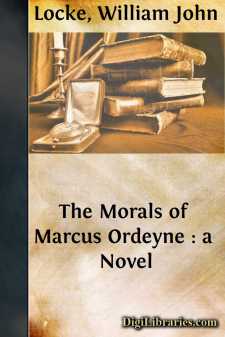Categories
- Antiques & Collectibles 13
- Architecture 36
- Art 48
- Bibles 22
- Biography & Autobiography 813
- Body, Mind & Spirit 142
- Business & Economics 28
- Children's Books 17
- Children's Fiction 14
- Computers 4
- Cooking 94
- Crafts & Hobbies 4
- Drama 346
- Education 46
- Family & Relationships 57
- Fiction 11829
- Games 19
- Gardening 17
- Health & Fitness 34
- History 1377
- House & Home 1
- Humor 147
- Juvenile Fiction 1873
- Juvenile Nonfiction 202
- Language Arts & Disciplines 88
- Law 16
- Literary Collections 686
- Literary Criticism 179
- Mathematics 13
- Medical 41
- Music 40
- Nature 179
- Non-Classifiable 1768
- Performing Arts 7
- Periodicals 1453
- Philosophy 64
- Photography 2
- Poetry 896
- Political Science 203
- Psychology 42
- Reference 154
- Religion 513
- Science 126
- Self-Help 84
- Social Science 81
- Sports & Recreation 34
- Study Aids 3
- Technology & Engineering 59
- Transportation 23
- Travel 463
- True Crime 29
William John Locke
William John Locke (1863-1930) was a British novelist and playwright known for his romantic fiction and popular novels. His notable works include "The Morals of Marcus Ordeyne" (1905) and "The Beloved Vagabond" (1906), both of which were adapted into successful films. Locke's writing often featured vivid characterizations and explored themes of love, adventure, and personal transformation.
Author's Books:
Sort by:
CHAPTER I This is not a story about myself. Like Canning's organ-grinder I have none to tell. It is the story of Paragot, the belovéd vagabond—please pronounce his name French-fashion—and if I obtrude myself on your notice it is because I was so much involved in the medley of farce and tragedy which made up some years of his life, that I don't know how to tell the story otherwise. To...
more...
CHAPTER I THE BROTHERS "Dick," said Viviette, "ought to go about in skins like a primitive man." Katherine Holroyd looked up from her needlework. She was a gentle, fair-haired woman of thirty, with demure blue eyes, which regarded the girl with a mingling of pity, protection, and amusement. "My dear," she said, "whenever I see a pretty girl fooling about with a primitive man...
more...
CHAPTER I "I love Nunsmere," said the Literary Man from London. "It is a spot where faded lives are laid away in lavender." "I'm not a faded life, and I'm not going to be laid away in lavender," retorted Zora Middlemist. She turned from him and handed cakes to the Vicar. She had no desire to pet the Vicar, but he was less unbearable than the Literary Man from London...
more...
I received a letter the day before yesterday from my old friend, Jaffery Chayne, which has inspired me to write the following account of that dear, bull-headed, Pantagruelian being. I must say that I have been egged on to do so by my wife, of whom hereafter. A man of my somewhat urbane and dilettante temperament does not do these things without being worried into them. I had the inspiration, however. I...
more...
CHAPTER I For reasons which will be given later, I sit down here, in Verona, to write the history of my extravagant adventure. I shall formulate and expand the rough notes in my diary which lies open before me, and I shall begin with a happy afternoon in May, six months ago. May 20th. London:—To-day is the seventh anniversary of my release from captivity. I will note it every year in my diary with a...
more...
Chapter I In the month of June, 1919, I received a long letter from Brigadier-General Andrew Lackaday together with a bulky manuscript. The letter, addressed from an obscure hotel in Marseilles, ran as follows:-- MY DEAR FRIEND, On the occasion of our last meeting when I kept you up to an ungodly hour of the morning with the story of my wretched affairs to which you patiently listened without seeming...
more...
CHAPTER I "Lady Fenimore's compliments, sir, and will you be so kind as to step round to Sir Anthony at once?" Heaven knows that never another step shall I take in this world again; but Sergeant Marigold has always ignored the fact. That is one of the many things I admire about Marigold. He does not throw my poor paralysed legs, so to speak, in my face. He accepts them as the normal...
more...
CHAPTER I PAUL KEGWORTHY lived with his mother, Mrs. Button, his stepfather, Mr. Button, and six little Buttons, his half brothers and sisters. His was not an ideal home; it consisted in a bedroom, a kitchen and a scullery in a grimy little house in a grimy street made up of rows of exactly similar grimy little houses, and forming one of a hundred similar streets in a northern manufacturing town. Mr....
more...
CHAPTER I I met Renniker the other day at the club. He is a man who knows everything—from the method of trimming a puppy's tail for a dog-show, without being disqualified, to the innermost workings of the mind of every European potentate. If I want information on any subject under heaven I ask Renniker. "Can you tell me," said I, "the most God-forsaken spot in England?" Renniker,...
more...
CHAPTER I This is the story of Doggie Trevor. It tells of his doings and of a girl in England and a girl in France. Chiefly it is concerned with the influences that enabled him to win through the war. Doggie Trevor did not get the Victoria Cross. He got no cross or distinction whatever. He did not even attain the sorrowful glory of a little white cross above his grave on the Western Front. Doggie was...
more...











